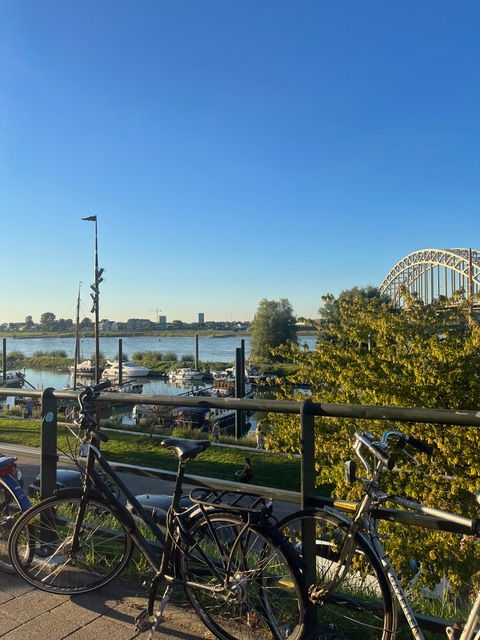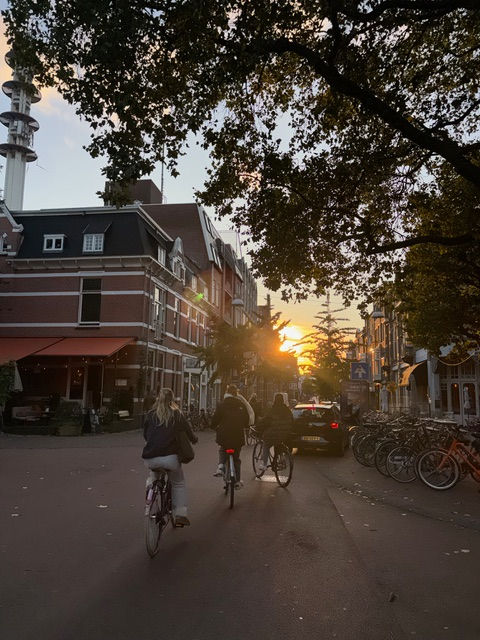BEYOND THE BIG SMOKE: REJECTING CAPITAL CITY CENTRISM
- Lippy

- Apr 22, 2024
- 4 min read
In August of last year, I exchanged Leeds for the Netherlands for my study abroad adventure. When I first told people about moving here, I was immediately confronted with: “I love Amsterdam!” Despite settling in Nijmegen for the past 8 months, just a short bike ride from the German border, the questions about the Netherlands’ capital persist. I must confess: I, too, find myself captivated by the allure of the ‘capital city buzz.’ Living in Nijmegen has made it all too easy and tempting to explore European hotspots like Brussels, Paris, and Copenhagen. However, amidst this wanderlust, a question arises: what exactly fuels this obsession with capital cities, and why does this fascination seem to be amplified among those living beyond the borders?
Let’s examine the case of London versus England. London’s prominence in the UK is well-known, but its global appeal is what truly sets it apart. Delve into the forums of Reddit and you’ll find people from diverse backgrounds gushing about the ‘Big Smoke’. One commenter even declared, “London is everything to everyone… it is the centre of the world.” Another, writing from Denmark, admitted to being drawn to London every 1-2 months without fully understanding why. I recently spoke with a student from Montevideo, Uruguay, who revealed how locals adorn their homes with miniature double-decker buses, treating London like a prized possession. Nonetheless, even she couldn’t quite put her finger on the exact allure. So, is London’s popularity merely a product of trend-following and hype culture?
Undoubtedly, London’s enduring appeal is deeply rooted in its rich history, stretching back to its origins as Londinium in Roman Britain. Situated strategically along the River Thames, the city quickly became a bustling centre of communication and trade, laying the groundwork for centuries of prosperity and influence. The industrial revolution further propelled London into the global spotlight, transforming it into a modern metropolis and a beacon of opportunity for innovators and entrepreneurs.
When it comes to the economy, London doesn’t just stand tall, it towers above the rest of the UK. When the 2007 financial crisis hit, London rebounded quicker than anywhere else. Why? It’s all down to the economic diversity: from big banks and financial wizards to retail royalty like Harrods and Selfridges.
And then there’s London, the bustling heart of politics and the stomping ground of the King. Did you know that a whopping 60% of overseas visitors to Britain are eager to catch a glimpse of a royal reality? More than a third consider Buckingham Palace a ‘must-see’ spot, closely followed by the Tower of London, home to the coveted Crown Jewels. The magnetism of the monarchy has gone global, with ‘royal-watching’ becoming a bonafide attraction for tourists flocking to the capital.
But wait, there’s more! London’s population is also the most diverse of any region in the UK. Walk the streets and you’ll hear a symphony of languages, smell the aroma of international cuisines, and bear witness to a rich tapestry of traditions and customs. From the bustling streets of Brick Lane to the serene parks of Notting Hill, London is a melting pot of cultures, a place where differences are celebrated and embraced. And it’s this diversity that fuels London’s international allure.
But, do Londoners share the same starry-eyed fascination with the city as those jet-setting tourists? To find out, I caught up with a University of Leeds student, who is herself a born and bred Londoner from Twickenham. For her, London’s appeal goes far beyond its palaces and prized jewels. It’s about the mishmash of cultures, languages, and traditions that make London unlike anywhere else in the UK. And let’s not forget the endless array of bars, restaurants, world-class museums, galleries, and iconic landmarks that make every corner of the city a bottomless treasure trove of history and culture. From the grand architecture of the North to the trendy vibes in the East, London has something up its sleeve to quench the curiosity of every generation.
Sure, London might have a reputation for being ‘posh’ and ‘rich’, but our Twickenham native insists that living in London is about much more than that. It’s about embracing the daily hustle and bustle, the packed public transport, the streets that never sleep, and the eye-watering rent costs. Though they are deterrents to some, these challenges form an integral part of the London experience. In fact, I think they’re what makes living in the capital city an exhilarating adventure: let’s face it, being a bit broke in a bustling metropolis like London, is just part of the process.
Italy stands out as a shining example of a country that has implemented decentralisation strategies to combat capital city centrism. Milan, Rome, Turin, Bologna, Naples, Florence – these are just a handful of household names in Italy’s diverse line-up of major cities. Power and resources have shifted away from Rome and towards these regional powerhouses, each wielding their own economic, cultural, and
administrative significance. This approach has not only diversified Italy’s economic landscape but also fostered a decentralised global attitude towards national identity. By delegating authority and investment to cities beyond the capital, Italy has unlocked the potential of its entire nation, proving that true progress lies in embracing the richness and diversity of all its urban centres.
Capital city centrism may appear to be a trend as inevitable as the flow of a river , but Italy’s glowing resolve shows us the wealth of opportunities beyond the capital’s borders. So, let’s broaden our horizons, take the road less travelled, and explore cities that don’t always make the headlines. For me, living in Nijmegen has proven far more enriching than the tourist-centric appeal of Amsterdam. It has opened my eyes to the diverse tapestry of cultures and communities that exist beyond the capital’s boundaries. Here’s to celebrating the Leeds, the Naples, and the Nijmegens of the world. Let’s give them the recognition they deserve, and in doing so, embrace the beauty of diversity both within
our own countries and across the globe.
Words and Images: Lauren Williamson, she/her
.jpg)








Comments